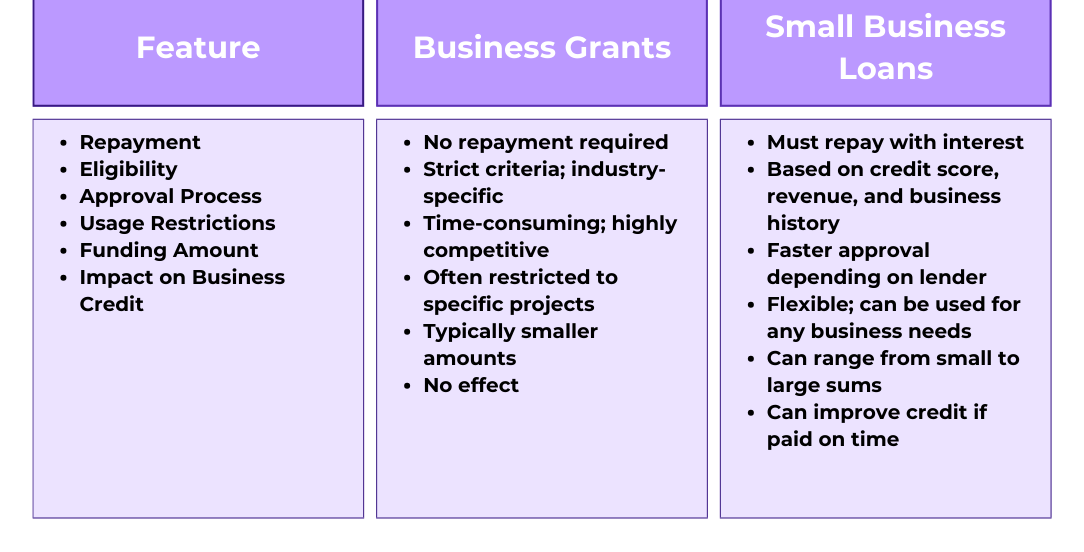Business Grants vs. Small Business Loans: Which is Right for You?
A comprehensive guide comparing business grants and small business loans, helping entrepreneurs determine the best funding option based on their needs, eligibility, and financial goals.
BUSINESS FUNDING & CAPITALSMALL BUSINESS GRANTSENTREPRENEURIAL FINANCE & LOANSFINANCIAL PLANNING FOR STARTUPS
Agile Mediaz
1/5/20253 min read


Starting or growing a small business often requires funding, and two of the most common options are business grants and small business loans. While both provide financial support, they serve different purposes and come with unique benefits and challenges. Choosing the right option depends on your business needs, financial situation, and long-term goals.
In this guide, we’ll break down the differences between business grants and small business loans, including their pros and cons, eligibility requirements, and which option may be best for you.
What Are Business Grants?
A business grant is essentially free money awarded to businesses that meet specific criteria. Grants are typically provided by government agencies, corporations, or nonprofit organizations to support entrepreneurship, innovation, or community development. Unlike loans, grants do not need to be repaid—making them an attractive funding option.
Pros of Business Grants:
✅ No Repayment Required: Unlike loans, you don’t need to pay back a grant, making it a risk-free funding source.
✅ Boosts Credibility: Receiving a grant can increase your business’s credibility and open doors to more funding opportunities.
✅ Encourages Growth: Grants are often designed to support small businesses in research, innovation, or expansion without financial pressure.
Cons of Business Grants:
❌ Highly Competitive: Many businesses apply for grants, making it difficult to secure funding.
❌ Strict Eligibility Criteria: Most grants are industry-specific or require businesses to meet certain conditions.
❌ Time-Consuming Application Process: Preparing grant applications requires detailed business plans, financial projections, and justification for funding.
Who Should Consider Business Grants?
Startups or businesses in industries like technology, healthcare, sustainability, or education where grants are common.
Business owners who do not want debt and are willing to invest time in the application process.
Companies looking for funding to support research, community programs, or innovation.
What Are Small Business Loans?
A small business loan is borrowed money that must be repaid with interest over time. Loans are offered by banks, credit unions, and online lenders, and they can be used for various business expenses, including purchasing equipment, expanding operations, or covering day-to-day expenses.
Pros of Small Business Loans:
✅ Quick Access to Capital: Loans can provide immediate funding to support business needs.
✅ Flexible Usage: Unlike grants, loans don’t have restrictions on how you use the funds.
✅ Variety of Options: Businesses can choose from term loans, lines of credit, SBA loans, and more.
Cons of Small Business Loans:
❌ Repayment Required: You must repay the loan with interest, which can impact cash flow.
❌ Credit & Financial Requirements: Approval often depends on credit history, financial health, and business revenue.
❌ Risk of Debt: If your business struggles to generate revenue, repaying the loan can become a financial burden.
Who Should Consider Small Business Loans?
Businesses needing fast access to funds for inventory, payroll, or expansion.
Entrepreneurs with good credit scores who can qualify for lower interest rates.
Companies that generate consistent revenue and can comfortably repay a loan.


How to Decide: Which One Is Right for You?
Choosing between a business grant and a small business loan depends on your funding needs, risk tolerance, and business stage.
Choose a Grant If:
✅ You’re in an industry with grant opportunities (e.g., tech, non-profits, sustainability).
✅ You prefer debt-free funding and have time to apply.
✅ You don’t need immediate funds and are okay with a lengthy approval process.
Choose a Loan If:
✅ You need quick access to capital for immediate business expenses.
✅ You have a strong credit history and can qualify for favorable loan terms.
✅ You’re willing to take on debt to grow your business.
Where to Find Business Grants and Loans
Where to Find Small Business Grants:
Grants.gov – A database of federal grants available to small businesses.
Small Business Innovation Research (SBIR) Program – Grants for startups in research and technology.
Corporate Grants (e.g., FedEx Small Business Grant, Visa Everywhere Initiative) – Grants provided by private companies to support entrepreneurs.
Local and State Business Grants – Many cities and states offer grants for small businesses in specific industries.
Where to Find Small Business Loans:
SBA (Small Business Administration) Loans – Government-backed loans with favorable terms.
Banks and Credit Unions – Traditional lenders offering term loans and business lines of credit.
Online Lenders (e.g., Kabbage, BlueVine, OnDeck) – Quick funding options with flexible repayment terms.
Microloans – Small loans provided by nonprofit organizations for startups and underserved entrepreneurs.
Final Thoughts: Funding Your Business the Right Way
Both business grants and small business loans provide essential funding opportunities, but the best choice depends on your business needs. If you want free funding and can dedicate time to the application process, grants are a fantastic option. However, if you need immediate capital and can handle repayment, a business loan may be the better route.
Regardless of which option you choose, proper planning, research, and financial management will set you up for success.


Key Differences Between Grants and Loans
Connect
Empowering small businesses through digital marketing solutions.
Explore
Innovate
contact@agilemediaz.net
© 2024. All rights reserved.

